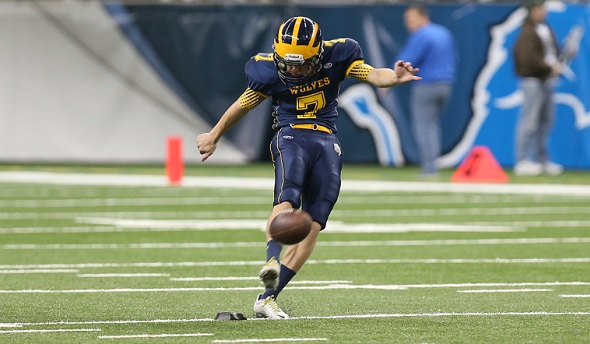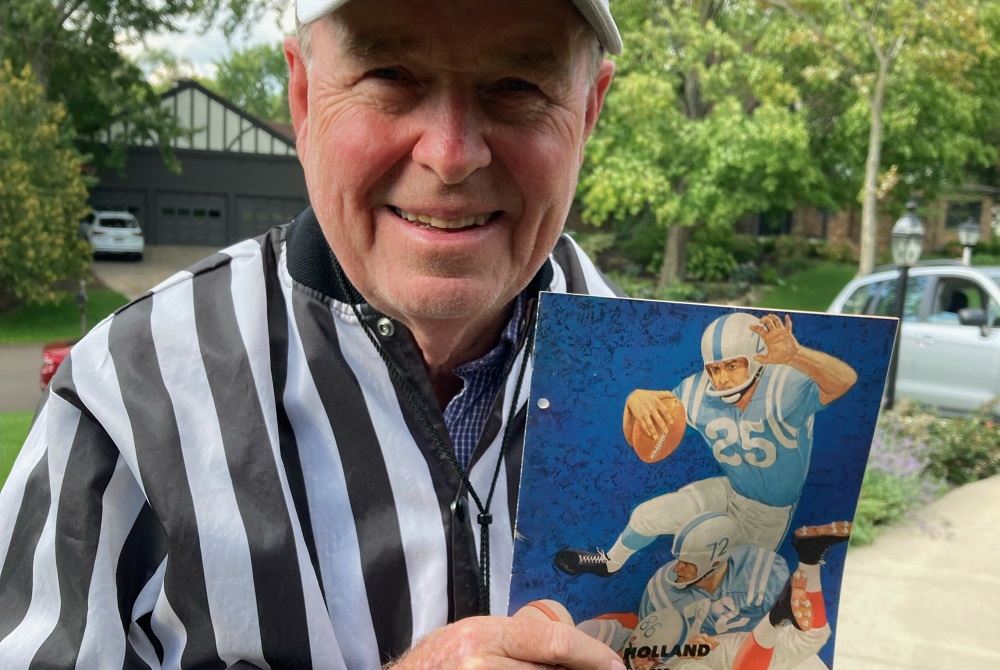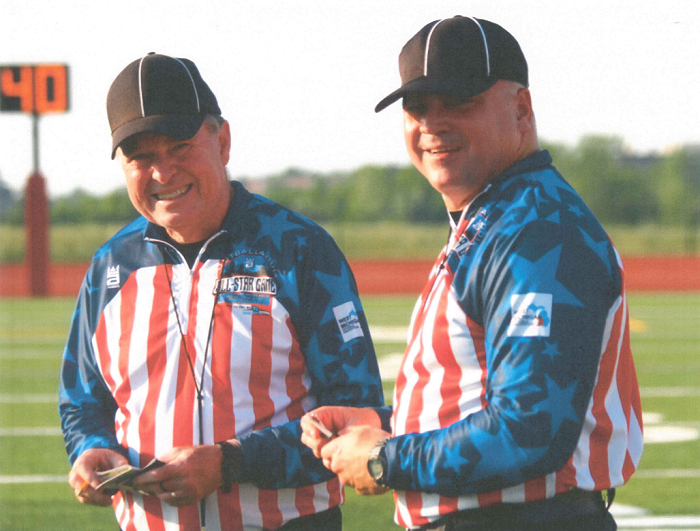
Catch These New Rules as Fall Kicks Off
August 7, 2014
By Geoff Kimmerly
Second Half editor
The first practices of 2014-15 begin next week for approximately 110,000 student-athletes taking part in eight sports in which the Michigan High School Athletic Association sponsors postseason tournaments, with nearly 41,000 football players practicing under a new policy in that sport aimed at continuing to improve player safety.
The new practice policy was proposed by a Football Task Force made up of coaches, administrators and MHSAA staff which met during 2012 and 2013, and approved by the MHSAA’s Representative Council at its Winter Meeting on March 21.
The modifications are meant to promote heat acclimatization and limit helmet-to-helmet contact during practices. They include:
- During the first week of practice, only helmets are allowed the first two days, only shoulder pads may be added on the third and fourth days, and full pads may not be worn until the fifth day of team practice.
- Before the first regular-season game, schools may not schedule more than one “collision” practice in a day. A collision practice is defined as one in which there is live, game-speed, player-versus-player contact in pads involving any number of players.
- After the first regular-season game, teams may conduct no more than two collision practice days in any week, Monday through Sunday.
- No single football practice may exceed three hours, and the total practice time for days with multiple practice sessions may not exceed five hours. Neither strength/weight training activities nor video/classroom sessions are considered practice for the purposes of the three or five-hour limits.
Previously, schools were required to conduct at least three days of practice without pads before beginning contact. The change to four days for gradual addition of pads was added to assist athletes in acclimating to being physically active in hot weather. Guidelines reducing the amount of collision practice go hand in hand with rules changes that have been made to reduce helmet-to-helmet contact in game situations. The policies in detail can be found on the Football page of the MHSAA Website.
“We think these new policies, with respect to the number of collision practices there can be before the first game, and after the first game, really are where 85 to 90 percent of our coaches already were,” said John E. “Jack” Roberts, executive director of the MHSAA. “This new policy sends a signal to that 10 to 15 percent to get on board with the rest of us to make football just as safe as it can possibly be.”
Practice in football must begin on August 11 for all schools wishing to begin regular-season games the weekend of August 28-30. Schools must have 12 days of preseason practice at all levels before their first game, and those 12 days of practice may not occur before 16 calendar days.
Practice sessions for all other sports begin on Wednesday (August 13). In golf and tennis, competition may commence no earlier than after three separate days of team practice, and not before seven calendar days. The first day competition may take place in golf and tennis is August 20. In all other fall sports, contests can take place after seven days of practice for the team and not before nine calendar days. The first day competition may take place in cross country, tennis, soccer, swimming and diving, and volleyball is August 22.
Only one football date precedes Labor Day, and most varsity games will take place on Thursday, August 28, that week. Subvarsity competition may begin on Wednesday, August 27. In Week 1, 255 games will be played on Thursday, 53 contests will be played on Friday, and five games will be played on Saturday.
Continuing the focus on player safety, a number of rules changes were made in football for 2014:
- Rules were added restricting targeting of opponent and illegal helmet contact with defenseless players, with both resulting in 15-yard penalties. Targeting is defined as taking aim at an opponent with the helmet, forearm, hand, fist, elbow or shoulder to initiate contact above the shoulders and with an intent beyond making a legal tackle or block, or playing the ball. A defenseless player can be considered one no longer involved in a play, a runner whose progress has been stopped, a player focused on receiving a kick or a receiver who has given up on an errant pass, or a player already on the ground.
- Illegal contact to a quarterback now will be considered roughing the passer, and the offense will receive an automatic first down in addition to the previous 15 yards from the penalty.
- On kickoffs, the kicking team must have at least four players on either side of the kicker, and no kicking team players except for the kicker may line up more than five yards behind the free-kick line. These changes were made to improve safety by balancing the kicking formation and shortening the potential run-up by kicking team players heading down the field to tackle the ball carrier.
A number of significant rules changes will go into effect for other fall sports:
- In cross country, the ban on wearing jewelry has been lifted (and also for track and field in the spring). The National Federation of State High School Associations deemed the ban unnecessary in these two sports because there is little risk of injury with minimal contact between competitors. Elimination of the rule will allow officials to further focus on the competition.
- In soccer, Michigan has adopted the National Federation rule stating home teams must wear solid white jerseys and socks, with visiting teams in dark jerseys and socks (dark defined as any color contrasting white). Also, officials may now wear green and blue shirts in addition to red and black as alternates to the primary yellow shirt with black pinstripes.
- Also for soccer, both field players and goalkeepers must now leave the field when injured and the referee has stopped the clock. Previously, an injured goalkeeper was not required to leave the game when the referee stopped the clock; going forward, the keeper must be replaced.
- In swimming and diving, one change affects the beginning of races and another impacts a specific event. The use of starter’s pistols is now prohibited; starters must use an alternative sounding device to start races. Additionally, in the backstroke, a swimmer may not submerge his or her entire body after the start except for during turns. The swimmer must remain on or above the water surface on the finish, eliminating the abuse of submerging well before touching the wall. This change also applies to the finish of the backstroke leg of the individual medley.
The 2014 Fall campaign culminates with postseason tournaments beginning with the Upper Peninsula Girls Tennis Finals the week of Sept. 29, and wraps up with the 11-Player Football Playoff Finals on Nov. 28-29. Here is a complete list of fall tournament dates:
Cross Country:
U.P. Finals – Oct. 18
L.P. Regionals – Oct. 24 or 25
L.P. Finals – Nov. 1
11-Player Football:
Selection Sunday – Oct. 26
Pre-Districts – Oct. 31 or Nov. 1
District Finals – Nov. 7 or 8
Regional Finals – Nov. 14 or 15
Semifinals – Nov. 22
Finals – Nov. 28-29
8-Player Football:
Selection Sunday – Oct. 26
Regional Semifinals – Oct. 31 or Nov. 1
Regional Finals – Nov. 7 or 8
Semifinals – Nov. 15
Finals – Nov. 21
L.P. Girls Golf:
Regionals – Oct. 8 or 9 or 10 or 11
Finals – Oct. 17-18
Soccer:
Boys L.P. Districts – Oct. 13-18
Boys L.P. Regionals – Oct. 21-25
Boys L.P. Semifinals – Oct. 29
Boys L.P. Finals – Nov. 1
L.P. Girls Swimming & Diving
Diving Regionals – Nov. 13
Swimming/Diving Finals – Nov. 21-22
Tennis:
U.P. Girls Finals – Oct. 1 or 2 or 3 or 4
L.P. Boys Regionals – Oct. 9 or 10 or 11
L.P. Finals – Oct. 17-18
Girls Volleyball:
Districts – Nov. 3-8
Regionals – Nov. 11 & 13
Quarterfinals – Nov. 18
Semifinals – Nov. 20-21
Finals – Nov. 22
The MHSAA is a private, not-for-profit corporation of voluntary membership by more than 1,500 public and private senior high schools and junior high/middle schools which exists to develop common rules for athletic eligibility and competition. No government funds or tax dollars support the MHSAA, which was the first such association nationally to not accept membership dues or tournament entry fees from schools. Member schools which enforce these rules are permitted to participate in MHSAA tournaments, which attract more than 1.4 million spectators each year.

Friday Nights Always Memorable as Record-Setter Essenburg Begins 52nd Year as Official
By
Steve Vedder
Special for MHSAA.com
August 31, 2023
GRAND RAPIDS – All Tom Essenburg could think of was the warmth of a waiting bus.
Five decades later, that's what Essenburg – then a senior defensive back at Holland High School – remembers most about a stormy Friday night before 2,100 thoroughly drenched fans at Riverview Park. He recalls having a solid night from his position in the Dutch secondary. He remembers a fourth-quarter downpour, Holland eventually winning the game and trudging wearily through the lakes of mud to the team's bus.
But what never dawned on Essenburg until much later was that he had been the first to accomplish something only three defenders in the history of Michigan high school football have ever done:
Intercept five passes in a single game.
"I knew after the game that I had a bunch of them, but (at the time) we were in a 0-0 game and my mind was on just don't get beat (on a pass) and we lose 7-0," he said of the Sept. 21, 1962, contest against Muskegon Heights.
It wasn't until the next morning's story in the Holland Evening Sentinel that Essenburg grasped what exactly had happened. He didn't realize until then that he had picked off five passes in all, including two over the last 1:52 that sealed a 12-0 win over Muskegon Heights. One of the interceptions went for a 37-yard touchdown, which Essenburg does vividly remember.
"I remember thinking to myself that I had to score," said Essenburg, who has been involved with high school sports in one fashion or another for more than 60 years. "There was a Muskegon Heights guy who had the angle on me and I pretty much thought I was going to get tackled, but I got in there."
Essenburg's recollection of the first three interceptions is a bit hazy after 61 years, but the next day's newspaper account pointed out one amazing fact. The Muskegon Heights quarterback had only attempted six passes during the entire game, with five of them winding up in the hands of the 5-foot-8, 155-pound Essenburg – who had never intercepted a single pass before that night. He would later intercept two more in the season finale against Grand Rapids Central.
It wasn't until the middle 1970s that Essenburg began wondering where the five-interception performance ranked among Michigan High School Athletic Association records. What he remembers most about the game was the overwhelming desire to find warmth and dry out.
"I just wanted to get to the bus and get warm. We were all soaked," he said. "For me it was like, 'OK, game over.' I was just part of the story."
Curiosity, however, eventually got the better of Essenburg. A decade later he contacted legendary MHSAA historian Dick Kishpaugh, who in an attempt to confirm the five interceptions, wrote to Muskegon Heights coach Okie Johnson, who quickly verified the mark.
It turns out that at the time in 1962, nobody had even intercepted four passes in a game. And since Essenburg's record night, only Tony Gill of Temperance Bedford on Oct. 13, 1990, and then Zach Brigham of Concord on Oct. 15, 2010, have matched intercepting five passes in one game.
Three years after Essenburg's special night, Dave Slaggert of Saginaw St. Peter & Paul became the first of 17 players to intercept four passes in a game.
 Essenburg laughs about it now, but his five interceptions didn't even earn him Player of the Week honors from the local Holland Optimist Club. Instead, the club inexplicably gave the honor to a defensive lineman.
Essenburg laughs about it now, but his five interceptions didn't even earn him Player of the Week honors from the local Holland Optimist Club. Instead, the club inexplicably gave the honor to a defensive lineman.
It was that last interception Essenburg cherishes the most. His fourth with 1:52 remaining at the Holland 17-yard line had set up a seven-play, 83-yard drive that snapped a scoreless tie. Then on Muskegon Height's next possession, Essenburg grabbed an errant pass and raced 37 yards down the sideline to seal the game with 13 seconds left.
In those days, running games dominated high school football and defensive backs were left virtually on their own, Essenburg said.
"I kept thinking don't let them beat you, don't let them beat you. No one can get beyond you. In those days, once a receiver got in the secondary, they were gone," said Essenburg, who describes himself as a capable defender but no star.
"I wasn't great, but I guess I was pretty good for those days," he said. "I'm proud that I'm in the record book with a verified record."
Essenburg's Holland High School career, which also included varsity letters in tennis and baseball, is part of a lifelong association with prep sports. After playing tennis at Western Michigan, he became Allegan High School's athletic director in 1971 while coaching the tennis team and junior varsity football from 1967-73.
But he's most proud of being a member of the West Michigan Officials Association for the last 47 years. During that time, Essenburg estimates he's officiated more than 400 varsity football games and nearly 1,000 freshman and junior varsity contests. In all, he's worked 83 playoff games, including six MHSAA Finals, the most recent in 2020 at Ford Field. An MHSAA-registered official for 52 years total, he's also officiated high school softball since 1989.
Essenburg also worked collegiately in the Division III Michigan Intercollegiate Athletic Association and NAIA for 35 years, including officiating the 2005 Alonzo Stag Bowl.
Essenburg said the one thing that's kept him active in officiating is being a small part of the tight community and family bonds that make fall Friday nights special.
"I enjoy being part of high schools' Friday night environment," he said. "All that is so good to me, especially the playoffs. It's the small schools and being part of community. I used to say it was the smell of the grass, but now, of course, it's turf.
"I can't play anymore, but I can play a part in high school football in keeping the rules and being fair to both teams. That's what I want to be part of."
While it can be argued high school football now is a far cry from Essenburg's era, he believes his even-tempered attitude serves him well as an official. It's also the first advice he would pass along to young officials.
"My makeup is that I don't get rattled," he said. "Sure, I hear things, but does it rattle me? No. I look at it as part of the game. My goal is to be respected.
"I've never once ejected a coach. It's pretty much just trying to be cool and collected in talking to coaches. It's like, 'OK Coach, You've had your say, let's go on."
While Essenburg is rightly proud of his five-interception record, he believes the new days of quarterbacks throwing two dozen times in a game will eventually lead to his mark falling by the wayside. And that's fine, he said.
"It'll get beaten, no question. It's just a matter of when," he said. "Quarterbacks are so big now, like 6-4, 200 pounds, and they are strong-armed because of weight programs. They throw lots of passes now, so there's no doubt it's going to happen."
Until Essenburg is erased from the record book, he'll take his satisfaction from his connection with Friday Night Lights.
"I love high school sports and being with coaches and players," he said. "My goal was once to work for the FBI or be a high school coach, but now I want to continue working football games on Friday nights until someone says no more."
PHOTOS (Top) Tom Essenburg holds up a copy of the program from the 1962 game during which he intercepted a record five passes for Holland against Muskegon Heights. (Middle) Essenburg, left, and Al Noles officiate an Addix all-star game in Grand Rapids. (Photos courtesy of Tom Essenburg.)

